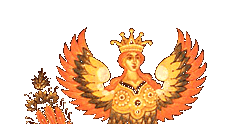"The Merchant Kalashnikov" stands out from Lermontov's narrative poems for its consistent first person narrative viewpoint. It is not a monologue by a hero complaining about his fate; rather, the distinction between hero and narrator is not blurred. In fact, the narrator is a stylized "Singer" in the old Russian folk tradition who does not address the reader at all: his audiences are his fellow singers, the boyar Matvey Romodanovsky, and his lady.
In the best epic tradition, the singer plunges directly into the story. At the court of Ivan the Terrible, the Tsar notes that one of his favorite guards, or oprichnik, is downcast. Asked for a reason by the Tsar, the oprichnik Kiribeevich responds that he has fallen in love with a beautiful girl from a merchant family, Alyona Dmitrievna, but she will have nothing to do with him. The Tsar, sympathetic, gives him jewelry and other gifts, advising him to get a matchmaker and seek the girl's hand in marriage, but not to worry if he is rejected: "If you win her love, then celebrate your wedding. If not, then don't be angry!"
At this point the singer intrudes to say that Kiribeevich has misled the Tsar by omitting the pertinent fact that Alyona Dmitrievna is already married, and to the real hero of the tale, Stepan Paramonovich Kalashnikov, a successful and hard working merchant in the silk trade. He is introduced in Part II, as the scene shifts to the Kalashnikov home. Kalashnikov waits impatiently for his wife to return from church; when she does, she is in tears, and her clothes are torn. At first Kalashnikov is angry, but his wife explains that Kiribeevich accosted her on her way back from church. He had refused to let her pass, offered her gifts, laid hands upon her, and kissed her.
The singer passes over Kalashnikov's reaction, sparing us the gnashing of teeth, tearing of hair, and swearing of vengeance. Instead Kalashnikov summons his two younger brothers to tell them what has happened, but very briefly. Then, in a matter-of-fact manner, he declares that he will fight Kiribeevich the next day in a boxing match, which is scheduled to be held on the ice of the Moscow River in the presence of the Tsar. Kalashnikov will try to kill the man who has dishonored his wife, but if he is killed then his brothers are to challenge Kiribeevich themselves one after the other and fight to the death for the family honor. The brothers accept this as their duty unquestioningly.
During the boxing match on the following day, Kiribeevich strikes first, hitting Kalashnikov in the chest. The bold merchant, gathering all of his strength, retaliates with a mighty blow to the side of the head. Kiribeevich is killed instantly.
The Tsar is angered at the unexpected death of his oprichnik, also a famous fighter, and demands to know why Kalashnikov killed Kiribeevich. The merchant respectfully replies that he will only explain to God, but he admits freely that he killed his opponent deliberately. Neither the singer nor Kalashnikov protests when the Tsar sentences him to death. Indeed, the Tsar displays his mercy by promising to take car of Kalashnikov's family and to have the ax sharpened so as to give him a quick and easy death.
Lermontov's most un-Byronic and undemonic hero is grateful to the Tsar, and the two men part with mutual respect. Theirs is a society in which certain things are down and other are not; in which authority is accepted; in which honor and duty govern one's behavior, not the "rights" of the individual or the passions. By no means does the singer praise the oprichnik or the Tsar. A few brief, oblique comments indicate that the oprichnik is notorious for his behavior. The singer's audience is meant to suffer with the brave merchant. His fate is called "cruel and shameful," and yet everything is seen in epic perspective. The singer ends the third and final section of his story just as he has the previous two with a cheerful refrain addressed to his fellow gusla players. He urges them to do honor to their audience, the boyar and his fair lady, and to all Christian folk in the land.
|



